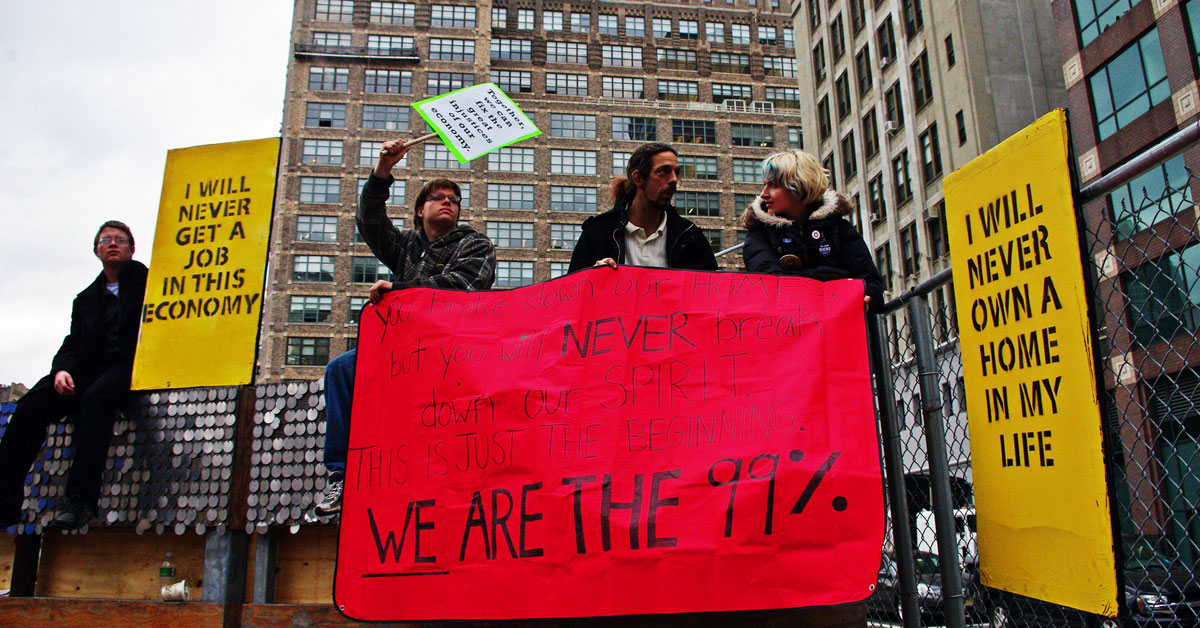A Polanyian Critique of Liberal Freedom
If we snap out of our liberal realist trance we’ll see liberal freedom for what it is: anti-political & anti-democratic.
Continue readingCategory

It’s a no win scenario until basically elites figure out that at the end of the day, as I like to tell my American hedge fund friends, the Hamptons is not a defensible position. […] Eventually people will come for you.”
–Mark Blyth, Professor of International Political Economy, Brown University
The stagflation of the 1970s presented a major challenge to the Keynesian economic theory that predominated in industrialized Western nations from the New Deal through the prosperous post-World War II years. To address this challenge, governments began experimenting with two alternative schools of thought: the libertarian methodological individualism of Ludwig von Mises, Friedrich August von Hayek, and members of The Austrian School, and the monetarist policies of The University of Chicago’s Milton Friedman.
These schools of thought form the foundation of neoliberal economic policy, which has grown to become the dominant economic world order today. It’s basic features include: privatization of the commons and public goods and services (transportation systems, public utilities, hospitals, schools, prisons, public lands, natural resources); austerity (cutting public spending on education, healthcare, pensions, public works, social welfare programs for the poor); deregulation (rolling back environmental regulation, labor laws, consumer protection legislation, etc.); and globalization (liberating private enterprise from any form of state control or intervention, regardless of how much social damage it might cause).
Decades of global neoliberal policy have been devastating for all but the tiniest minority of global elites. We’ve witnessed a massive redistribution of wealth from the poor and middle classes to the richest 1% of the population. Bubble-burst recessionary cycles have deprived millions of their homes and their jobs, leaving them deeply in debt. First World workers with First World expenses must compete with workers in emerging markets on wages. Poverty has increased dramatically. Unelected, unaccountable technocratic elites end-run democratic steering to transfer their casino capitalist investment losses onto the public books, while forcing governments to “tighten their belts” through growth and job-killing austerity. Deep austerity in Greece and other European nations threaten the very existence of the European Union.
In our essays addressing the subject of neoliberalism, we acknowledge and attempt to further articulate the central role that neoliberal capitalism has played (and continues to play) in creating the grim political, economic, and environmental predicaments we all face today. We also attempt to unpack and understand the ways in which unfolding events–from the Occupy Movement and the populist appeal of Bernie Sanders, to Brexit and the election of Donald J. Trump to the Presidency of the United States–are to varying degrees a reaction to the effects of neoliberal economic policy.
If we snap out of our liberal realist trance we’ll see liberal freedom for what it is: anti-political & anti-democratic.
Continue readingTaxation is theft, but the tollbooth economy is not. It’s all about freedom, serf. Welcome to the new feudalism.
Continue readingThe neoliberal left champions progressive positions on social and cultural issues, but only in a manner that treats criticism of existing economic arrangements like the third rail of politics. Viewed in this light the neoliberal left begins to look less like ‘the left’ and more like the market logic of neoliberal capitalism itself. I want to suggest that this is exactly how we ought to view it.
Continue readingNeoliberalism is the rationality through which capitalism finally swallows humanity.
Continue readingIf we understand the underlying significance of economic fatalism more fully, it might be possible to see how to break up the culture of pervasive resentment toward out groups that has emerged as the dominant class consciousness of the white working class.
Continue readingIn the age of globalism conventional conservative and progressive commitments have become confused. We now leave in an age of ideological schizophrenia.
Continue reading“I saw the Emperor – this world-spirit – riding out of the city on reconnaissance. It is indeed a wonderful sensation to see such an individual, who, concentrated here at a single point, astride a horse, reaches out over the…
Continue readingHong Kong Vigil on the 20th Anniversary of the Tienanmen Square Democracy Protests (2009). Elections cannot change anything, because, then, every time there’s an election everything will change.” –German Finance Minister Wolfgang Schäuble
Continue reading